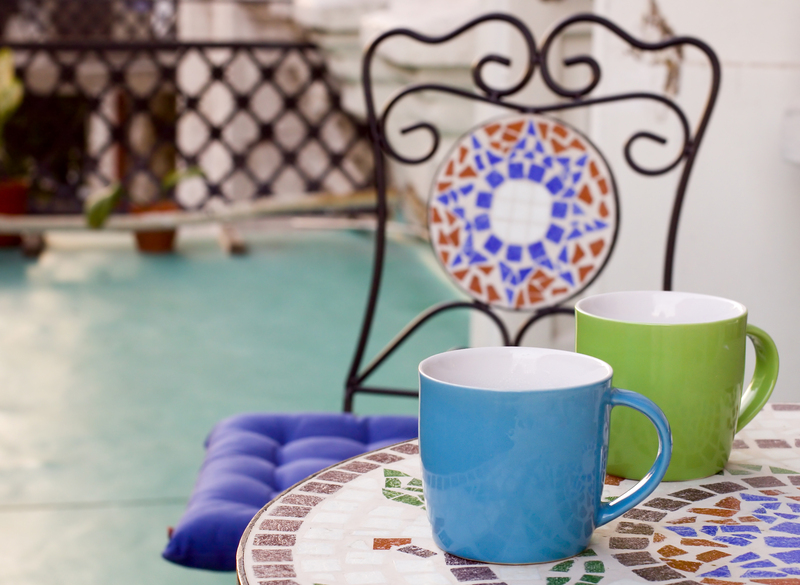Master the Art of Maintaining a Clutter-Free Space Every Day
If you've ever wished for a truly tidy home--or find yourself constantly tidying but rarely enjoying a clutter-free space--know that you're not alone. Achieving and sustaining an organized environment is not a one-time feat, but a daily practice. Transform your living space and your life by learning how to master the art of maintaining a clutter-free space every day.
Why Is Clutter-Free Living Important?
Clutter affects us on several levels. Research has shown that living in a disorganized or messy environment can:
- Increase stress and anxiety
- Make it harder to focus or be productive
- Cause feelings of embarrassment or shame
- Negatively impact relationships
- Lower your sense of well-being
*Conversely, a clutter-free home can have far-reaching effects:*
- Promotes calm and relaxation
- Boosts productivity and creativity
- Makes daily cleaning easier
- Improves mental clarity and mood
- Enhances your home's appearance

The Psychology Behind Clutter
Understanding why clutter accumulates is the first step towards maintaining an organized space every day. According to behavioral experts, clutter often builds up because of:
- Sentimental attachment to items
- Poor storage solutions
- Lack of time or motivation
- Inefficient cleaning habits
- Failure to routinely purge or donate unused items
*Acknowledging these underlying causes can help you create a more effective and customized plan to keep your space clutter-free.*
Steps to Achieve and Maintain a Clutter-Free Space Every Day
1. Start with a Deep Declutter
Maintaining a clutter-free environment begins with a clean slate. Commit a weekend or series of evenings to thoroughly declutter your home or workspace. Follow these decluttering tips:
- Tackle one area at a time (kitchen, closet, desk, etc.).
- Sort items into four categories: Keep, Donate, Recycle, Trash.
- Ask yourself honest questions: Have I used this in the last year? Does it add value to my life?
- Let go of duplicate or broken items, and be realistic about what you'll actually use.
*The less you own, the easier it is to keep your space tidy every day.*
2. Create Organizing Systems That Work for You
Every home and individual is different, so there's no one-size-fits-all solution for staying organized. To maintain a clutter-free space daily, you must create systems that reflect your habits and lifestyle:
- Invest in proper storage: shelving, bins, baskets, drawer dividers, etc.
- Designate a home for everything--including keys, mail, and everyday items.
- Label shelves or containers where helpful.
- Make sure storage is accessible and easy to use, especially for items you use frequently.
3. Establish Simple Daily Habits
The real secret to living clutter-free every day isn't a massive cleaning spree--it's small, consistent habits. Consider these effective strategies:
- Put things away immediately. Return items to their designated spots as soon as you're done with them.
- Clear surfaces daily. Before bed, clear kitchen counters, your desk, and tables.
- Incorporate a nightly reset. Spend 10-15 minutes picking up the day's clutter every evening.
- Implement the "one-in, one-out" rule. For every new item brought home, donate or discard another.
*These micro-habits will help you effortlessly maintain an organized space each and every day.*
4. Minimize Incoming Clutter
To keep your space clutter-free, you must also control what comes into your home. Adopt these strategies:
- Be intentional with purchases--only buy what you truly need and love.
- Unsubscribe from catalogs and junk mail.
- Regularly empty and sort your mailbox, bag, and car.
- Tame souvenirs, freebies, and gifts--accept only what you'll use or cherish.
5. Regularly Edit and Purge
Even with the best habits, belongings can still accumulate over time. Schedule intentional decluttering sessions every season to edit and organize your possessions. As you do so, consider:
- Assessing your wardrobe and donating unused clothing.
- Clearing out expired foods and medicines.
- Reviewing books, magazines, and paperwork for relevance.
- Re-evaluating toys and hobby supplies.
- Donating duplicates or items no longer serving you.
*Regular purging helps maintain a clutter-free environment without overwhelming effort.*
6. Apply the 'Zones' Strategy
Organize your home into functional zones based on how you use each space:
- Entryway: Shoe rack, hooks for bags and keys, basket for mail.
- Kitchen: Designate drawers and cabinets for cooking utensils, dishes, and pantry items.
- Living Room: Bookshelf, storage ottoman, basket for blankets/remotes.
- Bedroom: Nightstand drawers, under-bed storage, closet organizers.
- Home Office: File sorter, supply caddy, charging station.
When every type of item has a 'zone', it's much easier to identify clutter and deal with it immediately.
7. Get the Whole Household Involved
*Maintaining a clutter-free space should not fall on one person's shoulders.* Involve family members, roommates, or housemates in your daily maintenance routines. Offer clear instructions and assign responsibilities:
- Make organizing a family task--tidy up together each night for 10 minutes.
- Encourage kids to put away toys, shoes, and school items.
- Teach everyone where shared items belong.
- Celebrate successes to encourage consistency.
Daily Clutter Maintenance Checklist
To help you master the art of a clutter-free living space, use the following checklist each day:
- Make the bed immediately after getting up.
- Wash and put away dishes after each meal.
- Wipe down kitchen counters and table.
- Return shoes, coats, and bags to their designated spots.
- Sort and recycle/read mail as soon as it arrives.
- Clear your desk or workspace at the end of the workday.
- Place dirty laundry in a hamper.
- Spend 10-15 minutes daily returning stray items to their homes.
- Empty trash bins as needed.
Adapting Clutter-Free Routines to Your Lifestyle
Since every family and household is unique, it's essential to adapt your maintenance approach to your schedule and preferences. Here are some practical adjustments to consider:
- If you have kids: Use low bins and labels with pictures for easy clean-up, make tidying up a game, set a timer and race against the clock.
- If you have a busy schedule: Focus on critical areas (kitchen, entryway, bathrooms), split the daily reset into 2-3 five-minute sessions throughout the day.
- For small spaces: Maximize vertical storage, use under-bed boxes, and opt for multi-functional furniture.
- Living with roommates or a partner: Agree on shared standards for cleanliness, post a rotating responsibility chart, and hold "mini-declutter" sessions together.
Common Clutter Hotspots--And How to Tame Them
Despite your best efforts, some areas tend to attract mess more than others. Here's how to tackle them and maintain order:
1. Entryway
Solution: Add a shoe rack, hooks for coats/bags, and a basket for keys or mail. Remind family to empty bags and pockets before coming inside.
2. Kitchen Counters
Solution: Only keep essential appliances and utensils out. Store paperwork in a specific folder or organizer instead of piling it on counters.
3. Bedroom Floor
Solution: Place laundry baskets where needed, keep nightstands clear, avoid using floors as storage for clothes or bags.
4. Bathroom Surfaces
Solution: Use trays or caddies for toiletries, clear bottles/empty packaging regularly, limit what's stored on counters.
5. Living Room Surfaces
Solution: Use trays for remotes, magazines, and coasters. Have a designated basket for throws, toys, or pet items.
Digital Declutter: The Modern Clutter Epidemic
Clutter isn't limited to our physical spaces. Digital clutter--from overflowing inboxes to disorganized files--can also cause stress and distraction. Apply the same principles you use for physical clutter to the digital realm:
- Unsubscribe from unwanted email lists.
- Organize files and photos into folders.
- Delete unused apps and old downloads.
- Set aside time each week for digital clean-up.
Staying Motivated: The Benefits of a Clutter-Free Lifestyle
Whenever motivation wanes, remember these benefits of a consistently tidy space:
- Enjoy an inviting, relaxing home environment.
- Spend less time cleaning and more time living.
- Find what you need faster and avoid buying duplicates.
- Host guests without feeling stressed.
- Experience a greater sense of control and calm.

Tools and Resources for Maintaining a Clutter-Free Space
To master the art of daily clutter control, consider using these tools and resources:
- Storage solutions: Bins, baskets, shelf dividers, custom closet systems.
- Apps: Habit trackers (like Habitica or Streaks), home organization apps (Todoist, Tody).
- Books: "The Life-Changing Magic of Tidying Up" by Marie Kondo, "Decluttering at the Speed of Life" by Dana White.
- Donation centers: Local charities, thrift shops, or online groups like Freecycle.
*Investing in the right storage and routines streamlines your daily cleaning and makes maintaining an organized home almost effortless.*
Final Thoughts: Embrace Progress, Not Perfection
Remember: No home is picture-perfect at all times. However, with consistent habits and the right mindset, you can master the art of maintaining a clutter-free space every day. The key is not to let small messes grow into overwhelming chaos.
- Start where you are--perfection is not necessary to enjoy a peaceful space.
- Be patient with the process, and revisit this guide whenever you need motivation.
- Celebrate your progress and enjoy the peace, energy, and freedom that comes from clutter-free living.
Ready to transform your home and lifestyle? Start applying these daily strategies for clutter-free living today, and experience the difference that simplicity and organization can make every single day!